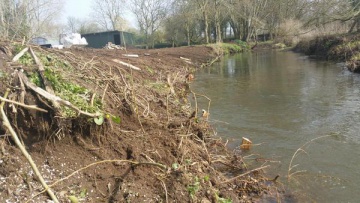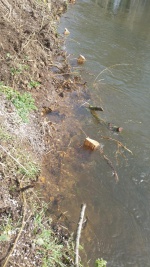|
Catchment and subcatchment
Catchment
Subcatchment
| River name
|
Blackwater (Bramshill to River Loddon confluence at Swallowfield)
|
| Area category
|
100 - 1000 km²
|
| Area (km2)
|
|
| Maximum altitude category
|
Less than 100 m
|
| Maximum altitude (m)
|
100100 m <br />0.1 km <br />10,000 cm <br />
|
| Dominant geology
|
Calcareous
|
| Ecoregion
|
Great Britain
|
| Dominant land cover
|
Arable and Horticulture
|
| Waterbody ID
|
GB106039017320
|
Other case studies in this subcatchment: Blackwater River Habitat Enhancements & Fish Passage
Site
| Name
|
Wolsey Cottage, Church Road, Swallowfield, Berkshire
|
| WFD water body codes
|
GB106039017320
|
| WFD (national) typology
|
|
| WFD water body name
|
Blackwater (Bramshill to River Loddon confluence at Swallowfield)
|
| Pre-project morphology
|
Naturally straight, Reinforced banks, Straightened, Single channel, Artificial channel
|
| Reference morphology
|
|
| Desired post project morphology
|
2-stage channel, Low gradient passively meandering, Pool-riffle
|
| Heavily modified water body
|
No
|
| National/international site designation
|
|
| Local/regional site designations
|
|
| Protected species present
|
No
|
| Invasive species present
|
Yes
|
| Species of interest
|
American mink (Mustela vison ), American signal crayfish (Pacifastacus leniusculus), Himalayan balsam (Impatiens glandulifera )
|
| Dominant hydrology
|
Groundwater, Quick run-off, Artificially regulated
|
| Dominant substrate
|
Gravel
|
| River corridor land use
|
Improved/semi-improved grassland/pasture
|
| Average bankfull channel width category
|
2 - 5 m
|
| Average bankfull channel width (m)
|
|
| Average bankfull channel depth category
|
0.5 - 2 m
|
| Average bankfull channel depth (m)
|
|
| Mean discharge category
|
1 - 10 m³/s
|
| Mean annual discharge (m3/s)
|
|
| Average channel gradient category
|
0.001 - 0.01
|
| Average channel gradient
|
|
| Average unit stream power (W/m2)
|
|
Project background
| Reach length directly affected (m)
|
850850 m <br />0.85 km <br />85,000 cm <br />
|
| Project started
|
2014/11/12
|
| Works started
|
2015/03/14
|
| Works completed
|
|
| Project completed
|
|
| Total cost category
|
1 - 10 k€
|
| Total cost (k€)
|
|
| Benefit to cost ratio
|
|
| Funding sources
|
Landowner
|
Cost for project phases
| Phase
|
cost category
|
cost exact (k€)
|
Lead organisation
|
Contact forename
|
Contact surname
|
| Investigation and design
|
Less than 1 k€
|
|
ACountryChap
|
Matt
|
Drew
|
| Stakeholder engagement and communication
|
Less than 1 k€
|
|
ACountryChap
|
Matt
|
Drew
|
| Works and works supervision
|
1 - 10 k€
|
|
ACountryChap
|
Matt
|
Drew
|
| Post-project management and maintenance
|
1 - 10 k€
|
|
ACountryChap
|
Matt
|
Drew
|
| Monitoring
|
|
|
|
|
|
Reasons for river restoration
| Mitigation of a pressure
|
Land drainage, Flood risk management, Flood protection maintenance works, Barriers to fish migration
|
| Hydromorphology
|
Freshwater flow regime, Quantity & dynamics of flow
|
| Biology
|
Fish: Abundance, Fish: Age structure, Invertebrates, Invertebrates: Abundance, Invertebrates: Diversity, Macrophytes
|
| Physico-chemical
|
|
| Other reasons for the project
|
Bank erosion, Landscape enhancement, Recreation, improve fishing, reduce flood risk
|
Measures
Structural measures
|
| Bank/bed modifications
|
Adding sinuosity, Alteration in channel dimensions, Bank reprofiling, Bank improvement, Bank stabilisation, Cleaning of spawning gravels, Construction of gravel banks, Creation of fish spawn nursing places, Creation of shoals/berms, Decrease sedimentation, Cut back of trees, Deflectors, Depth variation, Developing angling infrastructure, Diversification of in-channel features, Erosion Repair, Fenced off riverbank, Fencing, Fish habitat restoration, Gravel augmentation, Improvement of natural flows, Installation of bioengineering elements, Introducing large woody debris, Introduction of gravel, Livestock fencing, Introduction of spawning gravels, Lowering of embankments, Riparian planting, New bioengineering elements in order to stabilize slope banks, Placement of faggots, Removal of invasive plants, Tree management, Weir modification, high banks were “pushed” into the channel to create a low flow channel with natural bank profiles that support a range of emergent and marginal habitats., Removal of invasive species, Deculverting, Bed reprofiling, Habitat diversification, Large woody derbis dams, Creation of pools, Creation of berms, Creation of low flow channel, Opening of cut-off meanders, Riffle creation, Restoring gravel bed, Meandering channel, Creation of fish passes, Eel pass, Removal of fish barriers, Creation of fish passes, Weir modification
|
| Floodplain / River corridor
|
Adding sinuosity, Creation of fish refuge areas, Creation of fish spawn nursing places, Creation of shoals/berms, Decrease sedimentation, Cut back of trees, Deflectors, Depth variation, Developing angling infrastructure, Diversification of in-channel features, Erosion Repair, Fenced off riverbank, Fencing, Fish habitat restoration, Gravel augmentation, Improvement of natural flows, Installation of bioengineering elements, Introducing large woody debris, Introduction of gravel, Livestock fencing, Introduction of spawning gravels, Lowering of embankments, Riparian planting, New bioengineering elements in order to stabilize slope banks, Placement of faggots, Removal of invasive plants, Tree management, high banks were “pushed” into the channel to create a low flow channel with natural bank profiles that support a range of emergent and marginal habitats, Improving fish migration, Deculverting, Create riffle/pool, Vegetation removal
|
| Planform / Channel pattern
|
Adding sinuosity, Bank reprofiling, Bank improvement, Bank stabilisation, Cleaning of spawning gravels, Construction of gravel banks, Creation of fish refuge areas, Creation of fish spawn nursing places, Creation of pools and riffles, Creation of shoals/berms, Decrease sedimentation, Cut back of trees, Flow deflectors, Depth variation, Developing angling infrastructure, Diversification of in-channel features, Erosion Repair, Fenced off riverbank, Fencing, Fish habitat restoration, Gravel augmentation, Improvement of natural flows, Installation of bioengineering elements, large, Introducing large woody debris, Introduction of gravel, Livestock fencing, Introduction of spawning gravels, Lowering of embankments, Riparian planting, New bioengineering elements in order to stabilize slope banks, Placement of faggots, Removal of invasive plants, Tree management, high banks were “pushed” into the channel to create a low flow channel with natural bank profiles that support a range of emergent and marginal habitats, Improving fish migration, Actively meandering, Deculverting
|
| Other
|
Adding sinuosity, Alteration in channel dimensions, Bank reprofiling, Bank improvement, Bank stabilisation, Cleaning of spawning gravels, Construction of gravel banks, Creation of fish refuge areas, Creation of fish spawn nursing places, Creation of pools and riffles, Creation of shoals/berms, Decrease sedimentation, Cut back of trees, Deflectors, Depth variation, Developing angling infrastructure, Diversification of in-channel features, Erosion Repair, Fenced off riverbank, Fencing, Fish habitat restoration, Gravel augmentation, Improvement of natural flows, Installation of bioengineering elements, Introducing large woody debris, Introduction of gravel, Livestock fencing, Introduction of spawning gravels, Lowering of embankments, Riparian planting, New bioengineering elements in order to stabilize slope banks, Placement of faggots, Removal of invasive plants, Tree management, high banks were “pushed” into the channel to create a low flow channel with natural bank profiles that support a range of emergent and marginal habitats, Improving fish migration, Deculverting
|
Non-structural measures
|
| Management interventions
|
|
| Social measures (incl. engagement)
|
|
| Other
|
|
Monitoring
| Element
|
When monitored
|
Type of monitoring
|
Control site used
|
Result
|
| Before measures
|
After measures
|
Qualitative
|
Quantitative
|
| Element
|
When monitored
|
Type of monitoring
|
Control site used
|
Result
|
| Before measures
|
After measures
|
Qualitative
|
Quantitative
|
| Element
|
When monitored
|
Type of monitoring
|
Control site used
|
Result
|
| Before measures
|
After measures
|
Qualitative
|
Quantitative
|
Any other monitoring, e.g. social, economic
| Element
|
When monitored
|
Type of monitoring
|
Control site used
|
Result
|
| Before measures
|
After measures
|
Qualitative
|
Quantitative
|
Monitoring documents
Additional documents and videos
Additional links and references
Supplementary Information
Edit Supplementary Information
|


